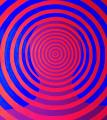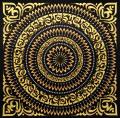
Boundary condition

Posts: 8617 Joined: 30-Aug-2008 Last visit: 24-Dec-2025 Location: square root of minus one
|
An excerpt from Michael Pollan's book, "This Is Your Mind on Plants: Opium-Caffeine-Mescaline" makes for a good read on the Guardian website: The invisible addiction: is it time to give up caffeine?It's my birthday soon, I think I'll ask for a copy of his book. “There is a way of manipulating matter and energy so as to produce what modern scientists call 'a field of force'. The field acts on the observer and puts him in a privileged position vis-à-vis the universe. From this position he has access to the realities which are ordinarily hidden from us by time and space, matter and energy. This is what we call the Great Work." ― Jacques Bergier, quoting Fulcanelli
|
|
|
|
|

Boundary condition

Posts: 8617 Joined: 30-Aug-2008 Last visit: 24-Dec-2025 Location: square root of minus one
|
If you take a close look at the "peyote cactus" illustrated on the front cover of the book, you might notice it more closely resembles an Astrophytum myriostigma 'Superkabuko', except with a pink flower.  No way is that a Lophophora. “There is a way of manipulating matter and energy so as to produce what modern scientists call 'a field of force'. The field acts on the observer and puts him in a privileged position vis-à-vis the universe. From this position he has access to the realities which are ordinarily hidden from us by time and space, matter and energy. This is what we call the Great Work." ― Jacques Bergier, quoting Fulcanelli
|
|
|

DMT-Nexus member
Posts: 847 Joined: 15-Aug-2020 Last visit: 17-Feb-2024
|
Finally some one writes seriously about this subject. For years I have been caught in the cycle of being constantly tired, having problems sleeping and always medicating myself with coffee when I need to get something done. I was completely blind about the negative role coffee had in this cycle. Quitting coffee has also meant learning a different lifestyle. If I'm tired I try to get some rest and energize myself through better nutrition and active lifestyle instead of stimulants. Coffee fits very well our hyperactive culture where we are tired because of constant stimulation in work and free time. I still find coffee valuable (like all plants) when used sparingly and by purpose.
|
|
|

Boundary condition

Posts: 8617 Joined: 30-Aug-2008 Last visit: 24-Dec-2025 Location: square root of minus one
|
Thanks for the reply, Tomte. So the question arises, how many Nexians have, or have had, a caffeine habit? “There is a way of manipulating matter and energy so as to produce what modern scientists call 'a field of force'. The field acts on the observer and puts him in a privileged position vis-à-vis the universe. From this position he has access to the realities which are ordinarily hidden from us by time and space, matter and energy. This is what we call the Great Work." ― Jacques Bergier, quoting Fulcanelli
|
|
|

DMT-Nexus member

Posts: 673 Joined: 04-Jul-2015 Last visit: 18-Feb-2025
|
I drink so much coffee before noon that I have to stop drinking it by about 3 in the afternoon or it will interfere with my sleep. I'm interested to see that JRE interview of Pollan and might order the book. Caffeine addict irony: Caffeine overdose = headache, and caffeine withdrawal = headache And good eye, DFZ. That's definitely an Astrophytum on the cover..  My flesh moves, like liquid. My mind is cut loose.
|
|
|

DMT-Nexus member
Posts: 576 Joined: 30-Oct-2020 Last visit: 23-Jan-2022
|
I was able to give up a major caffeine addiction last year. I was drinking up to 500 mg of caffeine a day for 6 years. The headaches suck for a couple weeks and the cravings are pretty bad for a few months but after getting into a comfortable sleep schedule I feel more energized and have less anxiety without it. I dont think I'll ever go back to ingesting caffeine to be honest.
Sugar is a whole different story. I have spent this past year trying to get out of the habit of eating and drinking sweets and found out that it is the hardest thing I have ever done.
|
|
|

Boundary condition

Posts: 8617 Joined: 30-Aug-2008 Last visit: 24-Dec-2025 Location: square root of minus one
|
I got off caffeine in one fell swoop without a headache thanks to daily use of Rue tea. First the Rue tea slowed the metabolism of caffeine such that I got nighttime tachycardia, then it provided me with the resolve to stop drinking caffeinated beverages while continuing to use Rue. Now that I've paused with the Rue for a few weeks, the caffeine has started to sneak back in, firstly thanks to some high-quality matcha powder and secondly a couple of very tasty soft drinks from my local organic shop. Time to scale it back again! Seeingisbelieving wrote:Sugar is a whole different story. I have spent this past year trying to get out of the habit of eating and drinking sweets and found out that it is the hardest thing I have ever done. Kelp powder is said to help with weaning oneself off sugar if you want to look into this. Personally, I recommend eating a lot of salad. “There is a way of manipulating matter and energy so as to produce what modern scientists call 'a field of force'. The field acts on the observer and puts him in a privileged position vis-à-vis the universe. From this position he has access to the realities which are ordinarily hidden from us by time and space, matter and energy. This is what we call the Great Work." ― Jacques Bergier, quoting Fulcanelli
|
|
|

\-= Conquer Your Fears =-/
Posts: 203 Joined: 07-Jun-2020 Last visit: 28-May-2023 Location: M.I.A.
|
Awesome read. Ty for sharing.
As he mentions in the article, I do agree with trying to be more intentional with the caffeine use.
I for one have been making drastic changes in my wellbeing, and currently the only caffeine I ever get is in my pre-workout supplement. On the rare occasion I eat out once every couple weeks I'll treat myself to a Dr. Pepper.
I definitely see it as an addiction though. As without using it prior to working out I barely have the motivation to get through my warm up, let alone try to do a powerlifting style routine. I'm even considering reducing my workouts from 4x a week to a harder 3x a week to reduce that caffeine intake.
I'm curious on how long and fast you build up a tolerance though so can space it out appropriately just as I'd do with my psychedelics use and microdoses.
|
|
|

DMT-Nexus member
Posts: 163 Joined: 24-Mar-2009 Last visit: 11-Apr-2025
|
According to self-appointed, psychedelic expert, Michael Pollan, we're not ready to decriminalize psilocybin mushrooms ( https://www.nytimes.com/...ushrooms-psilocybin.html ), so it's hard for me to take him or his work too seriously. Having said that, I know all too well about the harmful effects of habitual caffeine use. I generally try to minimize my use of caffeine as much as possible, though I typically have some on a daily basis. For example, I'm about to drink some tea with an 1/8 tsp. of guayusa and an 1/8 tsp. of black tea, so basically a 1/4 tsp. of caffeine containing herbs. I'm extremely sensitive to caffeine, so I can easily feel the effects of such small amounts, however I imagine that someone with a typical caffeine tolerance wouldn't feel much from such a light tea.
|
|
|

DMT-Nexus member

Posts: 856 Joined: 15-Nov-2009 Last visit: 03-Feb-2025
|
Since childhood I have had a condition where my sleep is overly sensitive, waking up often and to the slightest sounds around me. It appears to be genetic as my mother and other relatives on my mother's side seem to have the same condition. So I am often left sleep deprived and I have to take great care to make sure I get enough quality sleep. Ever since I started drinking rue, I quit tea and coffee for good with occasional exceptions where it is offered by others. I can see how the slightest amount of coffee gets me jittery and interferes with my sleep (BTW, even some plants that are supposed to enhance sleep stimulate me mentally and reduce the quality of my sleep, like valerian, mugwort, and vervain. Clary sage and mistletoe seem to really enhance my sleep). One more equally important reason was my questioning that why we always drink tea and coffee when there are so many amazing, very healthy and delightful wild plants to drink all around us. I only drink my own wildcrafted plants, and I drink a lot. I found it really interesting how Michael Pollan speculates so many great scale developments in history are correlated with the consumption of coffee. It seems we could call ourselves Homo caffeinus at this point. There really is a huge contrast between life with coffee and life without coffee. It probably resembles the relationship south American cultures have with coca, except their relationship is in a spiritual context. Have you ever seen a documentary about the Kogi? The men chew coca all day long and say it is what civilizes people. I saw a scene where an elder is initiating an 18 year old into manhood, teaching him about coca. He was saying "chew it every night and think about what you are going to do the next day." The consciousness of plants is a constant source of information for medicine, alimentation, and art, and an example of the intelligence and creative imagination of nature. Much of my education I owe to the intelligence of these great teachers. Thus I consider myself to be the “representative” of plants, and for this reason I assert that if they cut down the trees and burn what’s left of the rainforests, it is the same as burning a whole library of books without ever having read them.
~ Pablo Amaringo
|
|
|

DMT-Nexus member
 
Posts: 12340 Joined: 12-Nov-2008 Last visit: 02-Apr-2023 Location: pacific
|
Yup, the dude is mostly worth ignoring...showed up like yesterday and keeps saying things like that. Long live the unwoke.
|
|
|

Boundary condition

Posts: 8617 Joined: 30-Aug-2008 Last visit: 24-Dec-2025 Location: square root of minus one
|
Ironically, I've recently concluded that a cup of coffee in the morning does me more good than harm so I'm happy to reject the idea of getting hangups about my caffeine use. My coffee preparation method is mindful and ritualised and I'm especially aware of avoiding escalating intake. We'll have to see how that pans out come the winter. The NY Times article appears to be paywalled and the site won't let me read it. I'd like to know what Pollan's arguments are. ommani wrote:self-appointed, psychedelic expert, Michael Pollan Quote:Pollan is best known for his books that explore the socio-cultural impacts of food, such as The Botany of Desire and The Omnivore's Dilemma. To what extent would you say he has strayed outside his field here? And was his 2018 book, How to Change Your Mind, simply jumping on the bandwagon? “There is a way of manipulating matter and energy so as to produce what modern scientists call 'a field of force'. The field acts on the observer and puts him in a privileged position vis-à-vis the universe. From this position he has access to the realities which are ordinarily hidden from us by time and space, matter and energy. This is what we call the Great Work." ― Jacques Bergier, quoting Fulcanelli
|
|
|

DMT-Nexus member
Posts: 163 Joined: 24-Mar-2009 Last visit: 11-Apr-2025
|
jamie wrote:Yup, the dude is mostly worth ignoring...showed up like yesterday and keeps saying things like that. Agreed. downwardsfromzero wrote:The NY Times article appears to be paywalled and the site won't let me read it. I'd like to know what Pollan's arguments are. ommani wrote:self-appointed, psychedelic expert, Michael Pollan Quote:Pollan is best known for his books that explore the socio-cultural impacts of food, such as The Botany of Desire and The Omnivore's Dilemma. To what extent would you say he has strayed outside his field here? And was his 2018 book, How to Change Your Mind, simply jumping on the bandwagon? Before I get into my thoughts about Michael Pollan, I just want to say that I find the topic of habitual caffeine use to be worth talking about and appreciate you bringing it up, even if it is in the context of a writer I don't particularly care for. I see what you're saying about Michael Pollan arguably staying within his field in terms of being a journalist who writes about the interaction of people and plants. However, I don't think that makes him an expert on psychedelics (regardless of his 2018 book), which he seems to present himself as, given all the podcast interviews and speaking events in which he focuses on the topic. People I consider experts in the field like Kathleen Harrison, Dennis McKenna, and Paul Stamets have been involved with psychedelics for decades, regardless of the social, academic, and medical acceptance, thereof. Michael Pollan, on the other hand, despite appearing to be around the same age as the people I mentioned, just got involved with psychedelics in the past few years, as the research and corresponding social respectability of psychedelics has been ramping up. So yes, I do think of him as an opportunist who has jumped on the bandwagon that he is partially responsible for creating. Here are some quotes from the article. Of particular annoyance to me is that after openly writing about taking mushrooms on his own and hiding from his neighbors by the side of the road, he goes on to argue against decimalization. The implication of this double standard is that it's ok for an old, respectable, white guy like Michael Pollan to trip on mushrooms to his heart's content, but society at large is not ready to enjoy such freedoms. He also uses the example of traditional psychedelic use to argue against decriminalization, which strikes me as being disingenuous given how little information there is in his book (How To Change Your Mind) about the traditional use of psychedelics. "Only a few days ago, millions of Americans probably had never heard of psilocybin, the active agent in psychedelic mushrooms, but thanks to Denver, it is about to get its moment in the political sun. On Tuesday, the city’s voters surprised everyone by narrowly approving a ballot initiative that effectively decriminalizes psilocybin, making its possession, use or personal cultivation a low-priority crime... For the first time since psychedelics were broadly banned under the 1970 Controlled Substances Act, we’re about to have a national debate about the place of psilocybin in our society. Debate is always a good thing, but I worry that we’re not quite ready for this one." "No one should ever be arrested or go to jail for the possession or cultivation of any kind of mushroom — it would be disingenuous for me to say otherwise, since I have possessed, used and grown psilocybin myself. Like many others, I was inspired to do so by the recent renaissance of research into psychedelics, including psilocybin." ^ This seems like a weird contradiction, given that this article is in opposition to the decriminalization of mushrooms that passed in Denver (the title of the article/op-ed is Michael Pollan: Not So Fast on Psychedelic Mushrooms). "I look forward to the day when psychedelic medicines like psilocybin, having proven their safety and efficacy in F.D.A.-approved trials, will take their legal place in society, not only in mental health care but in the lives of people dealing with garden-variety unhappiness or interested in spiritual exploration and personal growth. My worry is that ballot initiatives may not be the smartest way to get there. We still have a lot to learn about the immense power and potential risk of these molecules, not to mention the consequences of unrestricted use. It would be a shame if the public is pushed to make premature decisions about psychedelics before the researchers have completed their work." ^ Michael Pollan may still have a lot to learn, but I daresay that his lack of knowledge and experience with psychedelics is not a universal phenomenon. "Whether in pre-Conquest South or Central America (where psilocybin has been used for centuries), or Ancient Greece, psychedelic substances were always approached with deliberateness and care. For the most part, the substances were not taken alone but usually in a group under the direction of an elder or shaman familiar with the mental territory, and they were used only on certain occasions, surrounded by ritual and with a clear intention. There was nothing casual about it." ^ Michael Pollan may be a decent journalist and writer, but he is definitely not an expert on the history of psychedelics, nor is he an ethnobotanist (like Kathleen Harrison) with intimate, first hand knowledge of how psychedelics are used in traditional cultures. In effect, the above statement strikes me as a sweeping generalization that serves to reinforce what I find to be the patronizing tone of the article. I realize that the psymposia podcast isn't everyone's cup of tea, but this episode, which breaks down the Michael Pollan op-ed in question is less contentious than others, and is worth listening to, in my opinion... https://www.psymposia.co...hanges-his-mind-podcast/
|
|
|

DMT-Nexus member
Posts: 847 Joined: 15-Aug-2020 Last visit: 17-Feb-2024
|
I might get what Pollan is after. When LSD first came, the culture around it was reckless. If new substances spread fast there is a risk that they are misused which undermines the potential they have. However, I don't believe that medical professionals know the better how these substances should be used. People who use them know and share their knowledge. Currently we are building a bottom to top culture, sharing our knowledge and experience. It's much more healthy way of finding the way than giving doctors the power to regulate what is right and legal and what is wrong and punishable.
|
|
|

DMT-Nexus member
Posts: 600 Joined: 13-Dec-2013 Last visit: 26-May-2025
|
I drink coffee every day, at least a cup a day, usually 2 or 3 cups, and no more than 4. I can't function without it; on the uncommon occasion that I forget to have a cup, I will find myself bent over with a mean headache, wondering if I might be getting the flu, by early to mid afternoon. I do think I need to moderate my intake, and probably drink less, and I think there are likely many others in a similar boat as me, but in the same vein, I think there are many people who do just fine with however much caffeine they choose to ingest. Although we all clearly share more in common than in differences, different people do react to different substances in various ways, and should regulate their use accordingly. Some people find their "sweet spot" and do regulate their use in a mature way: they choose which drugs suit them and which one's don't, and which contexts, circumstances, dosages, where's and when's. Terrence McKenna talks about this (on more than one occasion), most saliently when relating his adjuvant use of cannabis during tryptamine experiences, and it's multifaceted effects on the experience. It has mental and physical effects on him, and he has come to understand and expect what those effects are and what they're dependent on, and leverages this to his advantage. He knows that cannabis will likely catalyze the experience into full fledged mode, and it will also likely ease any nausea. As one of my late friends once said, "cannabis fills in the empty spaces of a trip. You're still tripping without it, but it's sort of superficial; once you smoke just a bit of weed, it really brings to the surface the stuff that you would have missed".
So, although my coffee is delicious (and I'm about to have another cup, which is equal parts Ecuadorian, Ethiopian, and Columbian origin beans), I know that it should be regulated, just like all the other things in my life. I do see the concern of simply "letting the lid off" psychedelics in a legal context. But, we need to look at it by breaking down the component pro's and con's of each option. As I think I've mentioned here before (and it should be pretty obvious regardless) anything which you are trying to analyze at a social level is inherently and endlessly slippery, and the truth is that we do not, and will not know the direct consequences and externalities of any type of change. We can figure out some of them though, and that is what we should look at. It seems to me that we should err on the side of liberation when it comes to psychedelics (this is my thoughts on most things though, so it's likely somewhat a part of my temperamental disposition to think this). If we leave psychedelics the way they are, then people can continue being punitively pursued and their lives can be thrown in the gutter. We already have seen plenty of examples of this, and even talked about specific cases on this forum. Some of these cases were truly appalling. Leaving things the way they are also, obviously, pushes things into the margins; this inevitably allows for, maybe even necessitates, the propagation of guru's and all of the attendant risks those gurus might carry. We've talked about that here too.
Decriminalizing psychedelics obviously has risks. The main ones I can pick out are that liberal or "unconstrained used" of them becomes more common, and that mental health issues, in turn, become more common. Would this actually happen though? I'm not sure; I think this liability may actually be attenuated. Even if we presuppose that there will be a higher number of "unconstrained use" cases, we do not know for sure what effect unconstrained use has on the number of "negative mental health outcomes". Supposing that it had the effect of significantly increasing negative mental health outcomes, those people would be more likely to initiate professional help as they would not be encumbered by fear of persecution. The mental help that they receive would be of a higher caliber, because the stigma surrounding use would change (this is happening regardless), and there would be better, more sophisticated and realistic protocols implemented for helping people dealing with "bad trips" or integration problems (or more serious problems). They could be helped, professionally, within the framework of a legal, and medical system, by people who have been through similar experiences.
As far as the argument that we need to "wait for the results" before changing laws is concerned; that argument is a pile of horseshit based on nonsense. What conclusions will we ever draw? If you have much experience with these things, you know the rabbit hole is infinite. This argument doesn't just violate the laws of the psychedelic realms though, it also violates the attitudes we take when employing the scientific methods; any good scientist, or logical thinker, knows that nothing is definite, ideas are just ideas. Conclusions are always tentative and we employ our best guesses getting by onj the information we have. This is also how we regulate substances in our lives, whether it be coffee or mushrooms. We can always get information from the people around us, and we should, and it is better to be in a group that is supportive, logical, and experienced (wise) rather than the converse, but at the end of the day, we deal with ourselves.
|
|
|

DMT-Nexus member
Posts: 4031 Joined: 28-Jun-2012 Last visit: 05-Mar-2024
|
dithyramb wrote:...It probably resembles the relationship south American cultures have with coca, except their relationship is in a spiritual context. Have you ever seen a documentary about the Kogi? The men chew coca all day long and say it is what civilizes people. I saw a scene where an elder is initiating an 18 year old into manhood, teaching him about coca. He was saying "chew it every night and think about what you are going to do the next day." That's 33mins25sec into this docu For a good night rest I got this advice once from an Indian Ayurveda practicioner: drink a glass of cucumber juice before bedtime. I did that a few times and could not debunk the tip. I love guayusa tea, it's also caffeine but it doesn't seem to let the heart run as mad as traditional coffee.
|
|
|

Boundary condition

Posts: 8617 Joined: 30-Aug-2008 Last visit: 24-Dec-2025 Location: square root of minus one
|
Thanks for all the interesting replies folks; hopefully I'll add something more cogent after a good night's sleep. “There is a way of manipulating matter and energy so as to produce what modern scientists call 'a field of force'. The field acts on the observer and puts him in a privileged position vis-à-vis the universe. From this position he has access to the realities which are ordinarily hidden from us by time and space, matter and energy. This is what we call the Great Work." ― Jacques Bergier, quoting Fulcanelli
|
|
|

DMT-Nexus member

Posts: 682 Joined: 30-Dec-2012 Last visit: 16-Jun-2024 Location: The Twilight Zone
|
Michael Pollan has been a popular author for people interested in food production and human health/culture for at least a decade. I think it's fair to say he entered the psychedelic sphere kind of out of the blue, but he certainly didn't come out of nowhere. I appreciate what he was trying to do with "How to Change Your Mind", but like others here I disagree with a lot of the conclusions he came to and I think anything he says about psychedelics should be taken with a grain of salt since that's not really his field at all. I have an on and off again relationship with coffee. I typically only drink it on days I work or when I'm out running errands. I don't notice much of a difference on the days I don't drink it, but I think that's because those are my days off with nothing to do so I sleep in anyways. On work days it makes a huge difference waking me up and getting me going, and I like to drink a few cups through the day until the early afternoon. By the time I get out of work though I'm completely spent and I think it makes me much more tired and low-energy in the long run. Drinking a lot of water makes a noticeable difference, but in general coffee doesn't feel like a sustainable source of energy for me at the rate I like to drink it. There really is nothing like that first sip in the morning though  "Consciousness grows in spirals." --George L. Jackson If you can just get your mind together, then come across to me. We'll hold hands and then we'll watch the sunrise from the bottom of the sea...
But first, are you experienced?
|
|
|

DMT-Nexus member

Posts: 2096 Joined: 20-Nov-2009 Last visit: 12-Nov-2023
|
Formore sustainble energy, Ilike Pu erh teas and Kombutchas. but I drink onecoffee a day min when I wake up. sometimes a nice espresso afterlunch. plussome teas afterinmorning or afternoon. Smell like tea n,n spirit !
Toke the toke, and walk the walk !
|
|
|

DMT-Nexus member
Posts: 91 Joined: 03-Mar-2009 Last visit: 12-Jan-2026 Location: USA
|
Caffeine is a really powerful drug. I find it to be extremely euphoric when taken without a tolerance, as do many others. For personal consumption, I usually have one cup of coffee around four hours into my 12 hour long work shifts. Sometimes I will have a second around the six hour mark, but not every time. The diuretic effect gets bothersome and the increase in tolerance is not desirable either. When I am at home, I usually drink 1-2 servings per day as well; at home I usually go for a lions mane enriched brew and this coffee comes with additional mental stimulation/clarity. Perhaps paradoxically, this can cause me to not crave redosing as much as I normally would with normal coffee. Unfortunately it is substantially more expensive than regular grounds--around 3 times as much. This also puts it more into the realm of a supplement or "treat." That is fine by me though, as it is another factor that limits consumption to a healthier level. Again, caffeine is a really powerful drug and tool too. Heeded for what it is, and used responsibly, it can cause great boosts in productivity, vitality, and cognition/mood. However, it's also important to use it sparingly, as to not lose the "magic." The nice part is that coffee in general is fairly healthy and you'll find it in abundance at nursing homes. Caffeine addiction, while a b---- to withdraw from, is relatively benign. It's easy to cold turkey for a week or so and then reapproach it more intelligently. I would eventually like to move into the utilization of tea more than coffee, instead opting for high quality leaves over beans. It may come with less caffeine per cup, yet the EGCG and L-theanine contents aren't to be dismissed lightly 
|